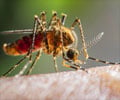The experimental study carried out in the roundworm Caenorhabditis elegans revealed the association between food odors and proteostasis.

The researchers were able to uncover the influence of smelling on the physiology of the digestive tract by investigating the recycling of green fluorescent proteins in the intestine. The brighter the green fluorescent signal within the worms, the more severe the accumulation of cellular waste, strongly correlating with defective protein degradation.
The underlying processes are mediated by the regulatory microRNA molecule mir-71. This molecule regulates the genetic program of olfactory neurons and, afterwards, degradation processes in the digestive tract. However, if this mechanism is blocked, not only are cellular recycling processes diminished, the animal’s lifespan is also reduced. In other words, roundworms with a non-functional ’sense of smell’ live much shorter - a strong indication for its physiological significance.
This mechanism is central for the proper processing of odor signals and mediates adjustments in the intestinal cells. ’We assume that the organism coordinates food intake and effective degradation this way’, commented first author Dr. Fabian Finger, who was recently awarded with the Klaus Liebrecht Prize of the UoC for his work.
’The impact of odors at the cellular level is a poorly investigated field’, says Thorsten Hoppe. ’It is well known that malfunctions in odor perception are associated with neurodegenerative diseases. We will further investigate the influence of the perception of odors on aging-associated disorders such as Alzheimer’s or Parkinson’s disease.’
Advertisement















